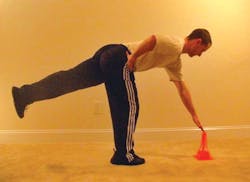Pain sucks plain and simple! Back pain and back injury are one of the most common causes of an officer having to leave law enforcement early. Some studies indicate that at any given time almost 10% of officers are out or on light duty with a back related issue. Other studies have shown that when anonymously surveyed almost 50% of officers state back pain or “minor” injury in the past 6 months. Back pain is far more prevalent in Law Enforcement than many of us realize and then factor in the culture and bravado of Law enforcement, you know the “pain don’t hurt” or my personal favorite “pain is weakness leaving the body” bravado. The athlete in me knows there is a time and place for pushing through the pain but the rehab guy in me gets nervous when we ignore pain as tissue damage is often occurring.
So let’s take this very complicated process and make it as simple as possible. Back pain has many causes and symptoms many of which are out of the scope of this article. So to keep it applicable and actionable the following suggestions are for those of you having soreness, stiffness and even very minor pain. If you are experiencing active and constant pain, especially with pain radiating up or down from the back go to your doc asap!
Most back pain that is NON-TRAUMATIC ie. pain in the absence of injury we can easily deal with as it’s usually biomechanical in its nature. In past articles we examined lower crossed syndrome which often causes this pain.
Then we covered how to mobilize the tissue that gets so tight from sitting for long periods and or standing /walking for long periods https://www.officer.com/article/10254182/sit-to-sprint and stretching https://www.officer.com/article/10232755/enforcement-flexibility. Please go back and read these articles as they are an important part of correcting the issue at hand.
So now that you have mobilized the tissue in your hips, IT Band, middle-back and done all your stretches it’s time to build in some corrective stability to help fix the underlying imbalances. While these exercises are not fancy they are difficult and most importantly will help to correct the problem. Of course the more time you spend on the foam roller and using your tennis ball for self massage the better of you will be when doing these 4 exercises 3 times per week.
1) The Bird Dog:
Preparation
Position your body on all fours.
Movement
• Brace your abdominals and retract the cervical spine, tuck your shoulder blades down. (Neutral Spine Position)
· Slowly raise and extend one arm and the opposite leg. (lock- elbow & knee)(Hold for 5 seconds)
• Return to the start position & repeat on the opposite side.
2) The Cross Knee Bridge:
Preparation
•Laying on your back, Leg crossed with the ankle laying across the opposite knee.
Movement
•Bridge up off the floor to the point that the back is flat, hold for 2 seconds, return to the floor and repeat.
Tips
•Do not allow the pelvis on the crossed side to drop or roll.
•Maintain an abdominal brace at all times.
•Keep the foot on the floor flat.
3) The Side Plank:
Preparation
• Position yourself on your side propped on your elbow, feet together.
• Maintain a ridged body alignment with proper head position.
Movement
• Brace your abdominals, and maintain spinal alignment.
• Raise your torso up off the floor, hold and repeat. Continue on the opposite side.
• Keep the glute muscles engaged throughout the exercise
4) The single Leg Reach:
Preparation
· Standing 2-3 feet from a cone or small object. Brace your abdominals. Balance on 1 leg.
Movement
· Hinge from the Hip down toward the cone.
· Never lock the knee, keep the abs tight and especially focus on keeping the pelvis and back flat and level during the movement.
· Perform 2-3 sets of 8-10 reps.
· Advance by squatting deeper or reaching further out. Make sure the knee stays in line with the foot and that the foot does not roll in during the descent. Keep your spine strait and level at all costs and make sure the hips are level.
Perform these 4 exercises after you roll/massage and stretch 2-3 times per week. Exercises 1,3,4 are time and technique dependent so quality of movement is far more important that number of reps. Exercise number 2 is done for 15-25 reps. All exercise should be done for 2-3 sets. Remember these are corrective and stabilizations movements so keep it slow and under control at all times.
Officers that have an injury and are NOT back on the job in 90 days have less than a 20% chance of ever returning to work. Pay it forward when it comes to your health, wellness and fitness as these exercises are corrective and preventative at the same time. Exercise is a great stress reducer and the more fit and regimented you are the easier it can be to mitigate the stressors, both physical and mental, in your job and life. Be fit, stay safe.
Web Links:
About The Author:
Bryan Fass is the author of "Fit Responder", a comprehensive wellness plan for the first responder, and the Fit Responder Blog. Bryan has a Bachelor's Degree in Sports Medicine and is certified as a licensed athletic trainer and a strength and conditioning specialist. He was a paramedic for over 8 years. Bryan has authored four books regarding fitness, wellness and human performance. Bryan is available for Consulting and Speaking on Public Safety Fitness Testing along with Fitness, Wellness and Injury Prevention Programs. Contact him via email to [email protected].
About the Author
Bryan Fass
is a leading expert on public safety injury prevention. As the president and founder of Fit Responder Bryan’s company works nationally with departments, corporations; state and local governments to design and run targeted injury prevention and wellness programs. He is frequently contacted for expert opinion and content contribution for all aspects of public safety fitness, ergonomics and wellness. Bryan authored the Fit Responder book used by departments and schools plus writes for numerous web and peer-reviewed journals including the NSCA-Tactical Strength & Conditioning journal, officer.com, ems-1.com & best practices in EMS. Bryan holds a bachelors’ degree in sports medicine with over 17 years of clinical practice, was a paramedic for over 8 years, and is certified as an Athletic Trainer (ATC, LAT), Strength Coach (CSCS) and the Functional Movement Screen (FMS). Fit Responder developed the nation’s first validated pre-hire Physical Abilities Test for EMS. Bryan is a sought-after speaker on a variety of topics including risk reduction, employee self-care, real world wellness and How to Eat on the street. www.fitresponder.com
Every Lift Counts!

